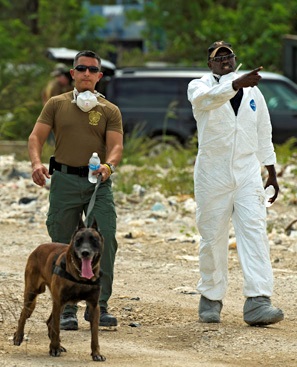Archive for February 3rd, 2011

Garbage operation and services return to normal
(CNS): The Department of Environmental Health (DEH) said today (Thursday 3 Feb) that the George Town landfill had returned to normal operations. Operators carrying heavy loads and hazardous waste can also resume offloading these items. As a result of the ongoing police investigation into the disappearance of DoEH employee Anna Evans at the site certain waste disposal services had been suspended since last week. Garbage collections are also expected to return to normal after the short interruption to the service. DEH Director Roydell Carter had explained the department was in full support of the search and would resume duties at the earliest opportunity.
For further information, please contact DEH Solid Waste Unit at 949-8793.

UK tax evaders face extra fines based on location
 (CNS): UK taxpayers who have accounts in the Cayman Islands will not fall victim to stiffer penalties if they fail to declare assets held here to the British taxman, after Cayman was listed as a category 1 jurisdiction in the HM Revenue & Customs new rating. From 6 April 2011 penalties for offshore non-compliance – for income tax and capital gains tax – will be linked to the tax transparency of the country involved and those using category 3 countries could see an increase of 200% in the penalties. Under-declared income and gains from territories which do not automatically share tax information with the UK will result in higher fines than for those who have undeclared income in territories that are sharing information.
(CNS): UK taxpayers who have accounts in the Cayman Islands will not fall victim to stiffer penalties if they fail to declare assets held here to the British taxman, after Cayman was listed as a category 1 jurisdiction in the HM Revenue & Customs new rating. From 6 April 2011 penalties for offshore non-compliance – for income tax and capital gains tax – will be linked to the tax transparency of the country involved and those using category 3 countries could see an increase of 200% in the penalties. Under-declared income and gains from territories which do not automatically share tax information with the UK will result in higher fines than for those who have undeclared income in territories that are sharing information.
David Gauke, Exchequer Secretary to the Treasury, said: "The game is up for those going offshore to evade tax. With the risk of a penalty worth up to 200 per cent of the tax evaded, they have a great incentive to get their tax affairs in order. We have given HMRC an extra £900m to tackle tax cheats because we are prepared to act against the minority who refuse to pay what they owe.”
Dave Hartnett, Permanent Secretary for Tax, at HMRC said the UK government was serious about tackling offshore evasion.
“Hiding tax liabilities offshore believing that you will never be discovered is no longer a realistic hope.
"These new penalties will increase the deterrent against offshore non-compliance. They build on other activity, including signing tax information exchange agreements, requiring information about offshore bank accounts and disclosure opportunities, including the Liechtenstein Disclosure Facility (LDF),” he added.
The new penalties for income tax and capital gains tax non-compliance classify territories into three groups, which determine what level of penalty will apply for non-compliance.
The Cayman Islands is one of only 36 countries in category one with most other offshore financial centres being left in category two. According to the HMRC where the income or gain arises in a territory in ‘category 1’, the penalty rate will be the same as under existing legislation. Where the income or gain arises in a territory in ‘category 2’, the penalty rate will be one and a half times the existing penalty and for those in ‘category 3’, the penalty rate will be double up to 200 per cent of tax.
Residents given reprieve over backyard quarry
(CNS): Residents in Mahogany Estates in the Lower Valley area of Bodden Town were breathing a sigh of relief this morning following the news last night that the Central Planning Authority had not granted permission to a developer to restart excavation in the heart of their neighbourhood. The residents, however, still have concerns that there is nothing to stop Whiterock Investments, the owner of the land, from re-applying to level the land, threatening to turn their neighbourhood into a quarry. Reverend Nicholas Sykes, who has acted as the spokesperson for the community’s campaign against the quarrying, said the constant need to fight these applications takes a serious toll on the community.
As the developer has excavated in the area in the past, blasting and removing fill, before he was stopped by the planning department, Sykes says the residents are all too well aware of the detrimental impact that kind of industrial work can have on people’s lives and all the residents live in fear of that happening again.
“At the moment there seems to be no limit on how many applications people can make, and they are not deterred from making very similar ones,” the reverend noted.
Residents believed their misery had ended in October 2008, when an excavation application was refused in accordance with the law that it would "cause noise and create a nuisance and annoyance to the residents of the area" and "negatively affect the quality of life of the residents in the surrounding area", but the application reappeared last year.
After various delays the CPA heard Whiterock Investment’s application to extract 295,000 cubic yards of fill, on Wednesday, once again threatening the peace and quiet of the community and the critical wildlife habitat. The CPA’s refusal to the application was revealed on Wednesday evening, to much relief after a long, and what residents described as a difficult, meeting.
The area in question that the developer wishes to excavate (which he insists is not a quarry) in order to level the land for development provides protection to the area from hurricanes and is also a critical wildlife habitat, home to many red listed flora and fauna and endangered indigenous species.
In particular, the white shouldered bat, which was believed to be extinct in the Cayman Islands, was rediscovered at the location in 2001, making it an area of particular interest.

Still no trace of Anna after specialist search
 (CNS): Despite an extensive day long search of the landfill area yesterday with the assistance of specialist canines, there is still no sign of the missing landfill worker, Anna Evans. The 37- year-old mother of five went missing last Thursday and the intensive manhunt has revealed no sign of her since. On Wednesday morning the governor joined the long list of people appealing to the wider community to contact officials with any, even the tiniest bit of information about Anna that could help find her. The police also issued another warning regarding what they said were malicious rumours that were disturbing people engaged in the search. (Photo Dennie Warren Jr)
(CNS): Despite an extensive day long search of the landfill area yesterday with the assistance of specialist canines, there is still no sign of the missing landfill worker, Anna Evans. The 37- year-old mother of five went missing last Thursday and the intensive manhunt has revealed no sign of her since. On Wednesday morning the governor joined the long list of people appealing to the wider community to contact officials with any, even the tiniest bit of information about Anna that could help find her. The police also issued another warning regarding what they said were malicious rumours that were disturbing people engaged in the search. (Photo Dennie Warren Jr)
Police are continuing to search the landfill and surrounding areas bit by bit, now assisted by experts from overseas, but officers are also said to be following other lines of enquiry into Anna’s disappearance. A police spokesperson said that during Wednesday’s search officers were continually being distracted answering calls from people asking if messages about Anna being found were true.
“These messages are not only inaccurate, they are insensitive and causing a great deal of distress for the family. They are also hindering the ongoing landfill search for Anna as people are calling the officers involved direct, distracting both them and the specialist dogs from the task at hand,” the spokesperson said as she asked those responsible for writing or sending them to stop being irresponsible and insensitive.
“If there are any significant developments in the enquiry the media and the public will be informed through the normal channels,” the RCIPS official added.

CCTV will spot witnesses
 (CNS): It won’t just be the criminals that will be under the watchful eye of the country’s CCTV system when it is rolled out over the coming weeks but the witnesses to that crime as well. With 140 cameras due to be installed in crime hot spots and vulnerable areas shortly, the police have said that the electronic surveillance equipment will be used not just to record the criminal acts but the people who were there to see it. The police commissioner said that, while criminals cover their faces, those present at the scenes of crime don’t, and instead of law enforcement having to wait for people to step forward, if officers can identify witnesses, they will be able to seek them out to persuade them to assist.
(CNS): It won’t just be the criminals that will be under the watchful eye of the country’s CCTV system when it is rolled out over the coming weeks but the witnesses to that crime as well. With 140 cameras due to be installed in crime hot spots and vulnerable areas shortly, the police have said that the electronic surveillance equipment will be used not just to record the criminal acts but the people who were there to see it. The police commissioner said that, while criminals cover their faces, those present at the scenes of crime don’t, and instead of law enforcement having to wait for people to step forward, if officers can identify witnesses, they will be able to seek them out to persuade them to assist.
Police Commissioner David Baines has said that he believes the first tranche of cameras to be installed in the $2 million project will begin to make a positive impact on the level of crime quickly and be a great help to officers during investigations. As well as providing an invaluable recording of crime taking place, the cameras will also record witnesses to crimes, which he says will be of great assistance to investigators, especially when criminals wear masks or have their heads covered.
Given the difficulties the police have had getting witnesses to come forward, Baines said he believes the CCTV will help officers trace witnesses who may have a better idea who the criminals are from being at the scene. “It will stop people who have witnessed a crime from being able to step into the background,” Baines stated, as he explained that at the moment the police are at the mercy of the people admitting they were there and voluntarily coming forward.
“People now have a personal choice as to whether they step forward and say what happened,” he said. “CCTV identifies the witnesses as well as the offenders and victims. They will allow us to identify people who potentially saw something and be proactive in seeking those witnesses out instead of waiting for them to come forward.”
He said the public has an obligation to assist the police in their investigation, and while they can’t force people to talk if they know who saw the crime, it gives the police an opportunity to persuade them to assist with the enquiry and if necessary offer witness protection.
The police commissioner revealed at the recent Chamber of Commerce ‘Be informed’ series meeting with the business community last week as well as a press briefing revealing the current crime statistics that the cameras were expected to be in place within the next six weeks and the priority locations were being identified.
He explained that some cameras will be placed on the streets in hot spot areas, others overlooking vulnerable properties such as banks, and those cameras designed to capture number plates will also be strategically placed at road junctions to view vehicles that could have been used in crime. Aside from picking up stolen vehicles and getaway cars, these cameras would also allow the police to track suspects and known offenders. The cameras store number plates so the police will be able to plot where people have been. “That’s important, not just to show where people were, it will also show where they were not,” Baines added, explaining that would be a useful tool to help confirm people are where they say they are during enquiries.
The cameras can be set up, he explained, to trigger an alarm when a certain number plate passes through but that would be used mostly for stolen vehicles. He offered some reassurance to the wider driving public when he said the alarm would not be set to trigger when cars with out of date coupons or insurance pass them.

Anti-crime plan with Cabinet
 (CNS): The work of the country’s National Security Council over the last twelve months is about to be reviewed by Cabinet and will be made public soon, the governor promised on Wednesday. Duncan Taylor said that while there was no easy way to turn the clock back on crime, the council had come up with, and agreed, a national strategy on crime prevention. Admitting that it had taken the new council, formed under the 2009 Constitution, some time to get going, he said that the strategy represented a considerable amount of work. He also said that his office was examining how, given the nature of the NEC, more information about what it was doing could be revealed to the public.
(CNS): The work of the country’s National Security Council over the last twelve months is about to be reviewed by Cabinet and will be made public soon, the governor promised on Wednesday. Duncan Taylor said that while there was no easy way to turn the clock back on crime, the council had come up with, and agreed, a national strategy on crime prevention. Admitting that it had taken the new council, formed under the 2009 Constitution, some time to get going, he said that the strategy represented a considerable amount of work. He also said that his office was examining how, given the nature of the NEC, more information about what it was doing could be revealed to the public.
Speaking at a press briefing marking the end of his first year in office, Governor Duncan Taylor revealed that the council had agreed the crime reduction strategy and said that although it was still early days for the council, it was beginning to play a useful role.
He said that the strategy had been arrived at after collaboration among all the ministries and looking at all the different programmes that existed in the Cayman Islands that contributed to a reduction in crime. He also said the council had examined previous reports, such as the comprehensive report on the pre-disposing factors to criminality by Yolande Forde published in 2005 (attached below), among others.
He said the crime reduction strategy was a comprehensive and substantive piece of work but he was aware that people were wondering what the council had been doing over the last twelve months. Not least because of the need to keep the details of the discussions confidential, information was not getting out about the council’s work. However, consideration was being given to getting more information about the work of the NEC out to the public, the governor revealed.
“I recognise that we need to find a way of giving more information about what it is we are discussing and where we are going, and what we are going to do next after the crime prevention strategy,” he said. “What’s the mechanism for taking that from being a piece of advice from the NEC to government actually taking it forward.”
He said that tackling crime was still an ongoing issue and that he had confidence in the work of the RCIPS and the commissioner. He pointed to a programme targeting youth in primary schools that had been identified as being at risk and making intervention with those children and their families.
The governor cited the imminent introduction of CCTV as another positive move towards addressing the rising crime in the community. While not a cure all, it was another element to help. He said the police were still going through a rebuilding process to fill key vacancies
He also pointed to the many legislative changes that have been enacted to make bringing prosecutions easier and said their impact on crime would be revealed over the coming months. “The next few months will be interesting as they reveal how those bills will work in practice,” he said, adding that there were many things going on that were designed to address crime.
However, the governor warned that with the recession still biting, people were still out of work and there was plenty of evidence that in a global downturn people turn to crime and that it was also important to get the economy going again to help address the problem of crime.
He pointed out that while there were still problems, the unprecedented situation when he arrived with some five shootings over a period of around 8 weeks had been addressed and the police had made serious headway in solving those cases.

Education fundamentals
Having written extensively on the failing public schools in America, I have come to recognize a strong, but often politically unpopular, correlation between discipline in the classroom and successful measurable outcomes. Orderly schools with strong principals who support their teachers, coupled with high expectations for all students, consistently produce superior, often times spectacular, results.
The design of the classrooms—accompanied by clever “catch phrases” such as “cells and bells”—is largely irrelevant. An impassioned teacher and an eager student sitting on a log can constitute an effective learning environment.
Likewise, there is little correlation between the amount spent on public education and measurable results. For example, in 2007, Washington, D.C, spent $15,511 to educate one student—the third highest per pupil expenditure in the United States. And yet the District of Columbia had the lowest student achievement performance in America. New York, which topped the nation in per pupil expenditures ($17,173) in 2007 had similar dismal results. Cayman is in the top tier of countries in the world in terms of per pupil expenditures.
Put another way, the relationship between financial inputs and cognitive outputs is virtually nonexistent. Building two new gold-plated high schools in Cayman at a cost of up to $150 million should give the Caymanian people no comfort whatsoever that our students will do one whit better in terms of academic achievement.
To examine more closely the uncomfortable concept that discipline is the key factor in academic success, I set out to identify and study the most disciplined high school in America, and I found it in the Marine Military Academy (MMA) in Harlingen, Texas.
In 1965, a small group of former United States Marines—most of them drill instructors—founded a preparatory school in Harlingen, close to the border of Mexico. The Marines were concerned that America was deteriorating badly in terms of education and social norms, including drug use, crime, gang behavior, and overall antisocial behavior. They reasoned that the discipline they learned and practiced in the Marine Corp could be adapted to a classroom setting to the benefit of young students and, by proxy, the country.
With the intent of writing a book, I enrolled as a “cadet” in MMA at age 46. Most of my fellow “cadets” entered MMA at age 14.
On Day One, like my classmates, I got my head shaved in the typical Marine tradition. I lived in the dorms with these students (tape recorders rolling) and struggled to keep up with demanding school work, taxing physical workouts, hours of homework, and, by “lights-out,” sheer exhaustion. The “design” of our classrooms was vintage shoebox: four walls, traditional desks and chairs, little else.
Most readers (and professional “academicians”) would be astonished at the transformations that take place at MMA.
Once the cadets say goodbye to their parents (mothers’ tears are shed in abundance) and walk “through the door,” their lives change forever. It turns out that former U.S. Marine drill instructors are not the least bit intimidated by teenagers with surly attitudes, unruly hair, or gangsta-style dress.
After students undergo one month of “basic training” (parents are prohibited from visiting their children during this period), the parents return to campus and most cannot believe they are interacting with the same youngsters they dropped off only four weeks earlier. It’s “Yes, Ma’am,” and “No Sir,” and “May I get the door for you, Mother?”
Most importantly, 95 percent (today’s figures) of graduating seniors go on to the college or university OF THEIR CHOICE. As you might expect, these schools include Harvard, Yale, Princeton, West Point, the Naval and Air Force Academies, and other fine institutions.
Is MMA an extreme example—yes. And is MMA the correct model for every student—no. But discipline, high expectations, and hard work are the essential ingredients for academic success.
As my friend George F. Will (syndicated columnist, Pulitzer Prize winner, and ABC News correspondent) once put it, it’s mainly a matter of “meat on the seat”: Students learn what they study in direct proportion to how long they study it.